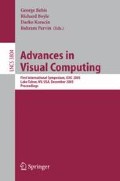Abstract
It is observed that only certain portions of the face images that are affected due to expressions, non uniform lighting and partial occlusions are responsible for the failure of face recognition. A methodology of identifying and reducing the influence of such regions in the recognition process is proposed in this paper. Dense correspondence is established between the probe image and a template face-model using optical flow technique. The face image is divided into modules and the summation of the magnitudes of the flow vectors in each module are used in determining the effectiveness of that module in the overall recognition. A low weightage is assigned to the modules whose summation of magnitudes of the flow vectors within that module is high and vice versa. An eye center location algorithm based on adaptive thresholding is implemented to align the test image with the face model prior to establishing the correspondence. Recognition accuracy has increased considerably for PCA based linear subspace approaches when implemented along with the proposed technique.
Preview
Unable to display preview. Download preview PDF.
References
Turk, M., Pentland, A.: Eigenfaces for recognition. Journal of Cognitive Neuroscience 3, 71–86 (1991)
Zhao, W., Krishnaswamy, A., Chellappa, R., Swets, D., Weng, L.: Discriminant analysis of principal components for face recognition. In: Int. Conference on Automatic Face and Gesture Recognition, vol. 3, pp. 336–341 (1998)
Huang, J., Yuen, P., Chen, C., Sheng, W., Lai, J.H.: Kernel subspace lda with optimized kernel parameters on face recognition. In: IEEE International Conference on Automatic Face and Gesture Recognition, pp. 327–332 (2004)
Martinez, A.: Recognition of partially occluded and/or imprecisely localized faces using a probabilistic approach. In: IEEE Computer Society Conference on Computer Vision and Pattern Recognition, vol. 1, pp. 712–717 (2000)
Zhang, Y., Martinez, A.: Recognition of expression variant faces using weighted subspaces. In: IEEE Computer Society Conference on Computer Vision and Pattern Recognition, vol. 1, pp. 712–717 (2000)
Lucas, B., Kanade, T.: An iterative image registration technique with an application to stereo vision. In: Proc. DARPA Image Understanding Workshop, pp. 121–130 (1981)
Valaparla, D.P., Asari, V.K.: An adaptive technique for the extraction of object region and boundary from images with complex environment. environment. In: IEEE Computer Society Proceedings of 30th International Workshop on Applied Imagery and Pattern Recognition, pp. 194–199 (2001)
Author information
Authors and Affiliations
Editor information
Editors and Affiliations
Rights and permissions
Copyright information
© 2005 Springer-Verlag Berlin Heidelberg
About this paper
Cite this paper
Gundimada, S., Asari, V. (2005). Face Alignment and Adaptive Weight Assignment for Robust Face Recognition. In: Bebis, G., Boyle, R., Koracin, D., Parvin, B. (eds) Advances in Visual Computing. ISVC 2005. Lecture Notes in Computer Science, vol 3804. Springer, Berlin, Heidelberg. https://doi.org/10.1007/11595755_24
Download citation
DOI: https://doi.org/10.1007/11595755_24
Publisher Name: Springer, Berlin, Heidelberg
Print ISBN: 978-3-540-30750-1
Online ISBN: 978-3-540-32284-9
eBook Packages: Computer ScienceComputer Science (R0)

